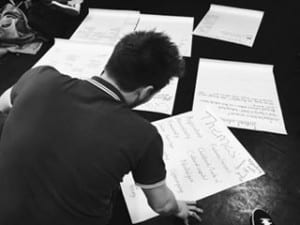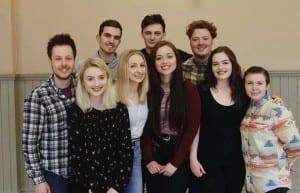This week has been a tough week for all members of the company. After an ultimatum from our producer that he was unhappy with the episodic structure of our four love stories we have decided as a group that after this weekend we must have a new idea to work from or stick with the idea we currently have. Due to the time constraints, a few members of the group are concerned about starting afresh as we have just been working on a scene that we will love. We call it the “silent movie scene” – this love story takes place in an office setting in the 1940’s. I’m meeting with our director over the weekend to discuss solutions to our producer’s queries.
Author: Danielle Louise Galley
The Devising Process
We’ve gradually moved away from the “Fisherman Story” and started looking at something that we are all invested in – relationships! However, we were so attached to the Fisherman character he was carried through into our second idea. Having 8 actors in our company we’ve begun to develop four different couples and we want to explore “love in real life”. Our aim is to make the shift from the Hollywood blockbuster couple on the silver screen to the real life couple sitting on the sofa watching them. Instead of the Fisherman and his son we’re going to stage the Fisherman and his wife. It is important to our company that all of our characters are substantive and have therefore all brought in stories about our grandparents for material to develop these characters. We’ve described in our copy how our company intends to bring to the stage all the little moments in life and explore all the different things that make us who we are. We intend to create four separate storylines for each couple and we are going to explore different means of telling each story. For example, we would like to play with staging one couple in an upturned specially built bed frame where the audience will feel they have a bird’s eye view of the couple. This is also how we would pitch ourselves to Arts Council England (ACE) if we were applying for funding. We believe our show would appeal to a wide audience. We feel the subject matter would appeal to the ‘Dinner and a Show’ category while the different storytelling means would appeal to students and academics in the arts community. Based on our copy and ethos around staging individuality we came up the name Modus as in ‘modus operandi’. However, we received feedback in the seminar that the harsh sounding Latin word did not reflect our light and fun ensemble. After another week of discussing different names that might closer reflect our personality as a company. We have unanimously voted on ‘The Pin Hinge Collective’. 
Week One
In these initial few weeks, our company has found it very easily to allocate non-acting roles and begin to fit into them. We’ve already become a very cohesive ensemble and have found our rhythm in rehearsals. My roles within the company are lighting designer and stage manager. The workshop with Flickbook in week one was particularly helpful in our early devising process. They walked us through some activities they employ when they’re trying to make new work. This workshop helped us come up with some activities of our own including a quick story writing task orchestrated by our director Dwain. Afterwards, we all read our stories aloud and picked one to develop. We call it “the Fisherman Story” – a son and his father go on a fishing trip. Over the next two weeks, we developed these characters and added potential new ones to the story. During these early stages, we were not only trying to find the identity of our first play but of ourselves as a company.
